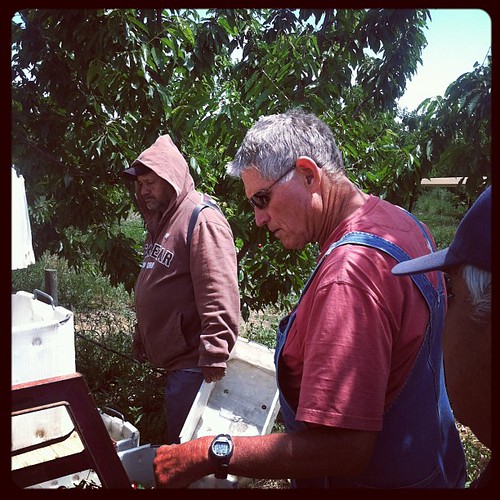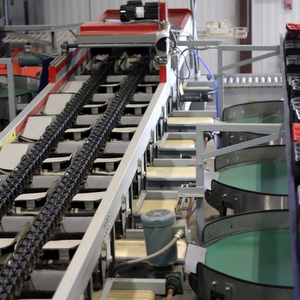THIS WEEK’S FRUIT

Farmer Al inspecting the Bing cherries
A Note From Farmer Al
The Packing Shed Post-harvest handling is the subject of many, many volumes of books published by universities in every agricultural region. The University of California has a huge department of scientists and researchers, on all 10 campuses, devoted to the ongoing and ever-changing needs of this critical component of fruit and vegetable agriculture.
Here at Frog Hollow Farm we devote huge resources (money and people) to post-harvest handling. Two years ago we invested 2 million dollars to build our own state of the art packing shed. 10,000 square feet which houses a new computer driven, state-of-the-art, AWETA packing line which moves the fruit from the picking tote to rotating, rubber padded, round, revolving tables where our packing crews pack from. (Sarah has affectionately named the new packing shed “Willie Wonka’s” packing shed.
With a gondola of empty boxes revolving around the packing crew, circling tracks for completed boxes, and the whirling-swishing sounds of all the moving parts, it really is something out of a child’s movie.) Each fruit must be carefully inspected, sorted, and then packed into the appropriate box for delivery to a retail location – maybe one close to you!
Our packing crew must be well trained with an eye for detail, as fruit comes off of the tree with many blemishes or other defects which must be graded out. Here at FHF about 75% of our fruit is Retail Grade. These are the “perfect” fruits for sending to stores: no cosmetics defects and not too ripe. 15% of the fruit consists of what we call Farmer’s Market Grade. This fruit, in our opinion, is the best fruit to be eaten. Generally it has some cosmetic challenges, it’s riper and juicier, thus not suitable for a retail setting. The remaining 10% is what we call our Kitchen Grade. Too ripe to be put in a box and shipped anywhere. This is what we use to make our conserves, chutneys and pastries. Nothing wrong that a knife and some heat won’t fix! Flavor is still there, high sugar, tastes like fruit should taste, but requires some TLC. Which our kitchen crew is happy to provide – but that’s a whole different newsletter topic! Enjoy our harvest!
Organically yours,

